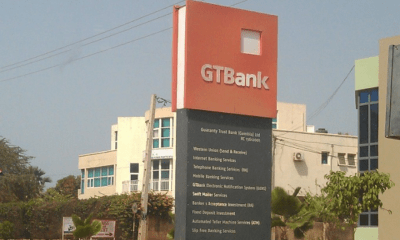Business
GTBank Drags 60 High-Ranking Executives Of 13 Commercial Banks To Court Over Alleged Debt

Guaranty Trust Bank (GTB) has taken legal action against 60 high-ranking executives from 13 commercial banks, including chairmen, CEOs, directors, and company secretaries.
This action comes as a result of a pending lawsuit between GTBank and Afex Commodity Exchange regarding a ₦17 billion Anchor Borrowers Programme loan.
The executives are facing contempt charges for allegedly failing to comply with a No-Debit-Order placed on Afex Commodity Exchange’s accounts with the banks.
In a court ruling (suit no FHC/L/CS/911/2024), Justice CJ Aneke of the Federal High Court in Lagos division has ordered the imprisonment of the bank chairmen, MDs, directors, company secretaries, and the liquidator of Heritage Bank (Nigeria Deposit Insurance Corporation) for not adhering to the court’s ruling on May 27, 2024.
Naija News reports that a legal notice has been published in national newspapers notifying the parties involved of the consequences of their disobedience to the court’s order.
The matter has since been adjourned to Thursday, this week.
Access Bank, Citibank, Jaiz Bank, Union Bank, Fidelity Bank, First Bank of Nigeria Plc, First City Monument Bank, NDIC (liquidator for Heritage Bank), Polaris Bank, Stanbic IBTC Bank, Standard Chartered Bank, Taj Bank, United Bank for Africa, and Zenith Bank, along with its principal officers, were all cited for contempt by the court.
In a court ruling dated May 27, 2024, the court directed twenty banks to transfer the funds held by the respondent to AFEX’s account with GTB until the repayment of ₦17.81 billion.
The N17.81bn loans consist of ₦15.77 bn, which is the outstanding and unpaid amount as of April 17, 2024, and ₦2.04bn for recovery and incidental expenses.
Furthermore, the court granted an injunction allowing GTB to take control of AFEX’s 16 warehouses located in seven states and sell the commodities stored in them. These commodities were acquired using the Central Bank of Nigeria Anchor Borrowers’ loan facility.
Earlier, the court had initiated contempt proceedings against AFEX and some of its principal officers, including Ayodele Balogun, Jendayi Fraaser, Justin Topilow, Mobolaji Adeoye, and Koonal Ghandi.
According to court documents, AFEX had obtained the Anchor Borrowers Programme Loan facility from GTB to provide financial support to smallholder farmers registered under the CBN Anchor Borrower’s program.
The loan was supposed to be repaid through the sale of commodities.
However, AFEX failed to fulfil its obligations, even after an extension was granted.
In response to the interim court order, AFEX stated that it had already repaid approximately 90% of the loan facility.
“However, a portion of the loan remains outstanding with the farmers and while we have paid out a portion out of our own purse, we remain in discussions with CBN over the outstanding amounts of the said facility,” the exchange said.
The exchange further stated that the entire loan amount was utilized to support farmers during three consecutive seasons, commencing in 2020.
Additionally, the exchange emphasized that it had diligently fulfilled its repayment obligations until the farmers, to whom the funds were disbursed, encountered challenges due to economic difficulties.
“Over 800,000 hectares of farmland were financed through the course of the programme’s operationalisation; however, significant macro and policy headwinds, including the cash crunch on the back of the Naira redesign policy, severely impacted the productive capacity and market participation of the smallholder farmers in the 2022/2023 season.
“This resulted in less than 40 cent repayment from farmers on their input loan bundles, down from our 90per cent repayment rates in the previous eight years of providing input financing for farmers. The low repayment rate ultimately impacted on our ability to refund the full value of the loan at the end of Q1 2023 and following a 6-month extension period,” AFEX added.
The farmers, who resorted to selling their produce below market value in order to obtain immediate cash inflows to support their families during the cash crunch, are still experiencing the repercussions, as highlighted by the commodities exchange.
Additionally, AFEX has urged the Central Bank of Nigeria to implement the collateral guarantee clause of the Anchor Borrowers program, which guarantees up to 70 per cent of the loan amount.
AFEX stressed that “Evidenced in the attached letters, our engagements with Guaranty Trust Bank Limited, a Participating Financial Institution in the program, as well as the apex bank have seen us highlight these limitations on the part of the defaulting farmers with suggestions being made to the CBN to activate the risk-sharing structure put in place for the program and release funds accordingly to sustain activities and allow for needed recovery efforts in our agriculture sector.
“In light of these engagements, we consider the recent steps by Guaranty Trust Bank Limited to be premature, coming in the midst of open conversations that are being had with all parties to find a path to resolution that does not unduly punish farmers, who have been the biggest hit by macroeconomic conditions that they had no control over.”
Naija News reports that the primary goal of the Anchor Borrowers’ Programme, initiated by the CBN in 2015, was to establish economic connections between smallholder farmers and processors in order to enhance agricultural production and ensure stability in food prices.
According to the guidelines of the programme, farmers who benefit from it are required to repay their loans with agricultural produce upon harvest.
This farm produce is expected to cover both the loan principal and the interest.
In return, an anchor, acting as an intermediary, provides the farmer with the equivalent cash amount, which is then deposited into their account.
As of 2022, a significant number of individuals, totalling at least 4.8 million, have benefited from the Anchor Borrowers’ Programme. In a statement released in 2023, the CBN announced that it had disbursed a total of N1.079tn under the programme. Out of this amount, over N500bn is currently due for repayment.
However, the CBN has decided to discontinue the programme as it shifts its focus from development financing interventions to its primary responsibilities of maintaining price and monetary stability.












